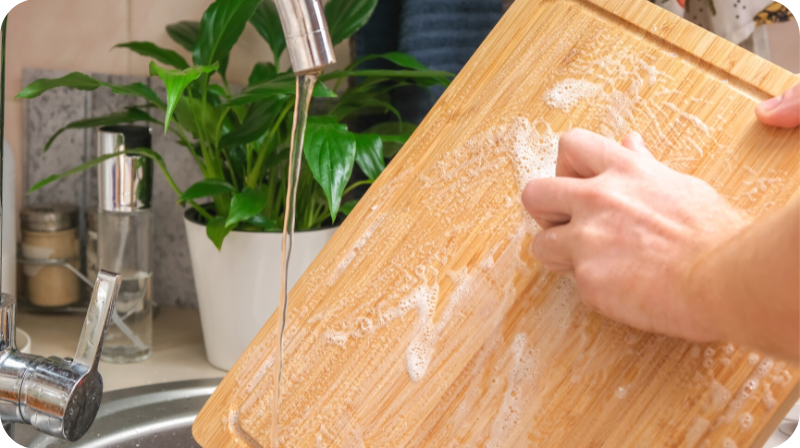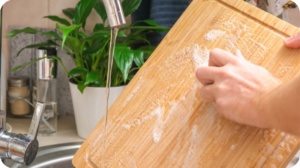Foodborne illness is far too common in home kitchens across America. Most cases of food poisoning or food-borne illnesses are caused by mishandling of food or surfaces with which it comes into contact. These sicknesses range from simple upset stomach to more serious case of salmonella or trichinosis that can land you in the hospital. Fortunately, all of these are easy to avoid. It’s just a matter of paying attention to basic food hygiene practices. As a bonus, you’ll get in the habit of using foods closer to their prime, meaning the dishes you prepare will taste better.

The first rule of kitchen hygiene is also the simplest: wash your hands. Often. Use hot soapy water, and scrub your hands for at least twenty seconds. Do this any time you’re getting ready to work with food, or between different types of food, such as prepping chicken and making a salad.
That basic practice extends to just about everything in the kitchen. The cleaner everything from utensils to sponges are, the less likely they will be to transmit bacteria or other harmful microorganisms.
The Must-Dos
You don’t necessarily need to bathe your cutting boards in bleach after every use, but certain practices are essential to insuring the best kitchen hygiene and safety.
- Know expiration dates. Obviously, it’s important to read labels and discard food products that are past their printed expiration dates. Unfortunately, far too few home cooks understand that even long-term staples and dry goods have expiration dates. For instance, all-purpose flour will be fine for 8-9 months on the counter, over a year in the fridge, and more than two years in the freezer. In the case of flour that goes bad, the worst consequence is that it can ruin baked goods. Other staples, like butter kept at room temperature, can go rancid and lead to food poisoning. Raw nuts exposed to air will go rancid after two months. (The oilier the nuts are, the quicker they spoil.) Research the expiration date—labeled or not—for any foods or ingredients you keep on hand for long periods of time. And keep in mind that refrigeration slows down—but does not stop—food decomposition and bacterial growth.
- Proper food handling and storage. When in doubt, refrigerate. Refrigeration rarely ruins food, but leaving food stuffs at room temperature often leads to bacterial breeding. More importantly, be extremely fastidious in how you handle proteins. Never store chicken with raw fruits or vegetables, or dairy products. The same goes for uncooked beef or pork. Cross contamination from raw protein juices is a major cause of home-based food poisoning. Keep foods confined in their own plastic, sealable containers. Cleaning the refrigerator thoroughly at least once a month will also help avoid cross-contamination.
- Surface safety. Every surface in your kitchen is a potential bacteria breeding ground. That’s why experts recommend not washing raw chicken; the water can splash and spread bacteria to areas beyond the sink. Wash knives and utensils between uses where you’ll be handling different types of foods. Sanitize countertops once a week with hot soapy water or an antibacterial cleaner, or after any large meal. Wash sponges and dishcloths every two days, and dish towels at least once a week. Sanitize any surface immediately after coming into contact with raw eggs, uncooked poultry, or soil from produce roots.
Basic food hygiene and kitchen cleanliness are not hard to achieve. They just require a modest amount of diligence. The payoff is that you will be protecting your family’s health and ensuring the most nutritious meals possible.





